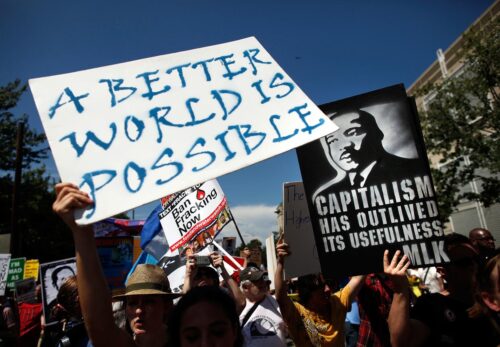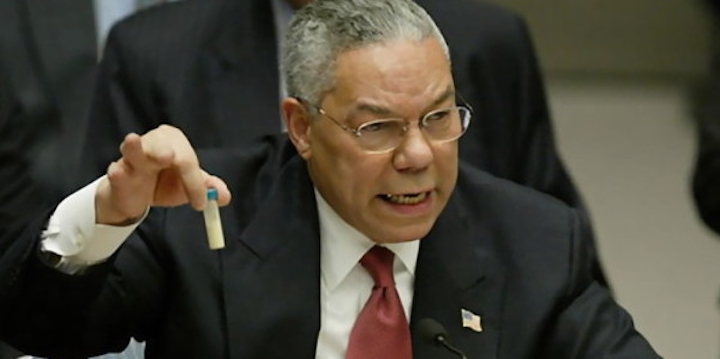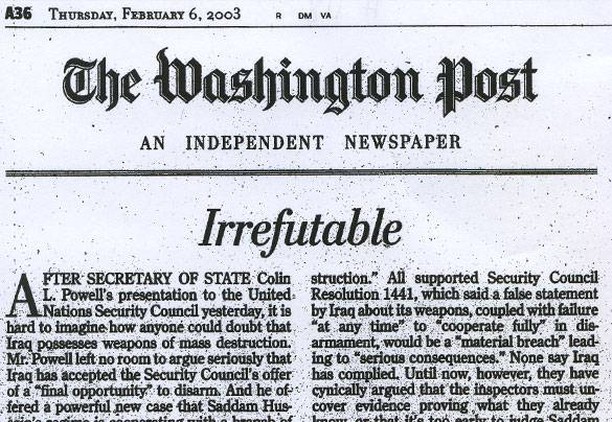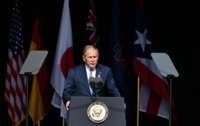It is almost taken for granted, if not an article of faith, in the progressive milieu (e.g., here) that the US empire is declining. Does this hold up, or is it comfort food for the frustrated hoping for the revolution?
First, it is essential not to confuse the ongoing decline of the living conditions of US working people with a decline in the power of the US corporate empire. The decline of one often means the strengthening of the other.
In the aftermath of World War II, the US was the world manufacturing center, with the middle class rapidly expanding, and this era did end in the 1970s. It is also true the heyday of uncontested US world and corporate neoliberal supremacy is over, its zenith being the decade of the 1990s after the collapse of the Soviet Union and its allies. Now, looming on the horizon is China, with the US empire and its subordinate imperial allies (Britain, France, Germany, Japan, Spain, Belgium, Canada, Australia, Italy) unable to thwart its rise this century, even more than when China stood up in 1949.
Yet the US imperial system still maintains decisive economic and political dominance, cultural and ideological hegemony, backed by tremendous military muscle. If US ruling class power were in decline, why have there been no socialist revolutions − the overturning of capitalist rule − in almost half a century? What would the world look like if the US lacked the muscle to be world cop?
Imperialism continually faces crises; this is inherent to their system. The question is: which class takes advantage of these crises to advance their interests, the corporate capitalist class or the working class and its allies at home and abroad. In the recent decades, capitalist crises have resulted in setbacks for our class, and a steady worsening of our conditions of life.
Previous proponents of US empire decline have predicted its demise with an expanding Communist bloc, then Germany and Japan with their supposedly more efficient capitalist production methods, then the European Union encompassing most of Western Europe into a supra-national entity, then the Asian Tigers, and then BRICS (Brazil, Russia, India, China, and South Africa). All challenges turned out to be wishful thinking. Now the proponents of decline expect China itself will soon supplant US dominion. We explore a number of the economic, political, and military difficulties the US empire confronts in its role as world cop.
Imperial Decline or Adjustments in Methods of Rule?
A common misconception among believers of US ruling class demise holds that imperial failure to succeed in some particular aim signifies imperial weakening. Examples of setbacks include Afghanistan, the failure to block North Korea from developing nuclear weapons, catastrophic mishandling of the COVID pandemic, and seeming inability to reign in the mammoth US national debt. However, throughout history, successful maintenance of imperial hegemony has never precluded absence of terrible setbacks and defeats. Most importantly, the fundamental question arising from a setback is which class learns to advance its interests more effectively, the imperial overlords or the oppressed.
The US rulers, as with other imperial nations, have proven adept at engineering more effective methods of control from crises, as Naomi Klein’s Shock Doctrine illustrates. For instance, in the mid-20th century the imperial powers were forced to relinquish direct political governance of their colonial empires, often due to costly wars. Until after World War II, the Western nations owned outright most of Africa and much of Asia. Yet this new Third World political independence did not herald the end of imperial rule over their former colonies. The imperialists simply readjusted their domination through a neocolonial setup and continued to loot these countries, such as siphoning off over $1 trillion every year since 2005 just through tax havens.
Likewise, for seven decades the imperial ruling classes endured repeated defeats attempting to overturn the seemingly invincible Russian revolution. But they only needed to succeed one time, using a new strategy, to emerge victorious.
A third example, the growing US national deficit due to the cost of the war on Vietnam forced Nixon to no longer peg the value of the dollar to gold at $35 an ounce. After World War II, the US had imposed the dollar as the international reserve currency, fixed at this exchange rate. Today gold is $1806 an ounce, yet the dollar continues as the world reserve currency. The US rulers resolved their crisis by readjusting the manner their dollar reigned in international markets.
A fourth example is the world historic defeat dealt the empire at the hands of the Vietnamese. Yet Vietnam today poses no challenge to US supremacy, in sharp contrast to 50 years ago.
The US ruling class is well versed in the lessons gained from centuries of Western imperial supremacy. They have repeatedly demonstrated that the no longer effective methods of world control can be updated. Bankruptcy in methods of rule may not signify a decline, but only the need for a reset, allowing the domination to continue.
Part 1: US Economic and Financial Strength
Decline in US Share of World Production
A central element of the waning US empire argument comes from the unparalleled economic rise of China. As a productive powerhouse, the US has been losing ground. As of 2019, before the COVID year reduced it further, the US share of world manufacturing amounted to 16.8%, while China was number one, at 28.7%.
Similarly, the US Gross Domestic Product itself (GDP) slipped from 40% of the world economy in 1960 to 24% in 2019. GDP is the total market value of all the finished goods and services produced within a country.
When GDP is measured by the world reserve currency, the dollar, the US ranks first, at $21 trillion, with China number two at $14.7 trillion. Using the Purchasing Power Parity measure of GDP, which measures economic output in terms of a nation’s own prices, China’s GDP surpasses the US at $24.16 trillion. By either measure, a steady US erosion over time is evident, particularly in relation to China, and a major concern for the US bosses.
Worsening US balance of trade reflects this decline. In 1971 the US had a negative balance of trade (the value of imports greater than the value of exports) for the first time in 78 years. Since then, the value of exports has exceeded that of imports only two times, in 1973 and 1975. From 2003 on, the US has been running an annual trade deficit of $500 billion or more. To date the US rulers “pay” for this by creating dollars out of thin air.
Ballooning US National Debt
The ballooning US national debt is considered another indicator of US imperial demise. The US debt clock puts the national debt at $28.5 trillion, up from $5.7 trillion in 2000. According to International Monetary Fund (IMF) numbers, the US debt is 118% of the GDP, near a historic high point, up from 79.2% at the end of 2019.
The international reserves of the imperialist nations do not even cover 2% of their foreign debt. In contrast, China tops the list with the largest international reserves, which covers 153% of its foreign debt.
However, today US debt as a percent of GDP is lower than in World War II, at the height of US economic supremacy. Germany’s debt to GDP ratio is 72%. Japan’s is 264%, making its debt over two and a half times the size of the country’s GDP. China’s is 66%.
Yet a key concern with the ballooning national debt − inflation caused by creating money backed with no corresponding increase in production − hasn’t been a problem in any of these countries, not even Japan. The immediate issue with debt is not its size in trillions of dollars, but the degree annual economic growth exceeds the annual interest payment on the debt.
In the US, this payout costs almost $400 billion a year, 1.9% of GDP. Federal Reserve Board president Powell stated: “Given the low level of interest rates, there’s no issue about the United States being able to service its debt at this time or in the foreseeable future.” Former IMF chief economist and president of the American Economic Association, Olivier Blanchard likewise declared: “Put bluntly, public debt may have no fiscal cost” given that “the current US situation in which safe interest rates are expected to remain below growth rates for a long time, is more the historical norm than the exception.” According to these ruling class economists, the huge size of the US national debt presents no economic difficulty for their bosses.
Technological Patents
Patents are an indicator of a country’s technological progress because they reflect the creation and dissemination of knowledge in productive activities. Today China is on the technological cutting edge in wind power, solar power, online payments, digital currencies, artificial intelligence (such as facial recognition), quantum computing, satellites and space exploration, 5G and 6G, drones, and ultra-high voltage power transmission. In 2019, China ended the US reign as the leading filer of international patents, a position previously held by the US every year since the UN World Intellectual Property Organization’s Patent Cooperation Treaty System began in 1978.
The failure of the US rulers to thwart China’s scientific and technological advances threatens the preeminence the US holds on technological innovation. Rents from the US corner on intellectual property is a major contributor to the US economy. The drastic measures the US has taken against Huawei exemplify the anxiety of the empire’s rulers.
US technological superiority is now being challenged. Yet, as John Ross points out, “Even using PPP measures, the US possesses overall technological superiority compared to China…. the level of productivity of the US economy is more than three times that of China.”
The US Still Controls the Global Financial Network
While the world share of US manufacturing and exports has shrunk, the US overlords still reign over the world financial order. A pillar of their world primacy lies in the dollar as the world’s “reserve currency,” an innocuous term referring to US sway over the global financial and trade structure, including international banking networks, such as the World Bank and the IMF.
Following the 1971 end of the dollar’s $35 an ounce peg to gold, Nixon engineered deals with the Middle East oil exporting regimes, guaranteeing them military support on condition they sell their oil exclusively in dollars. This gave a compelling new reason for foreign governments and banks to hold dollars. The US could now flood international markets with dollars regardless of the amount of gold it held. Today, most of the world’s currencies remain pegged directly or indirectly to the dollar.
To facilitate growing international trade, the Society for Worldwide Interbank Financial Telecommunications (SWIFT) was created in 1973. SWIFT is a payment and transaction network used by international banks to monitor and process purchases and payments by individuals, companies, banks, and governments. Dominated by the US, it grants the country even greater mastery over world trade and financial markets. Here, China poses no challenge to US supremacy.
After the euro became established, the percent of world reserves held in US dollars diminished from the 71% share it held in 2001. Since 2003, the dollar has kept the principal share, fluctuating in the 60-65% range. Today, the percent of world nations’ currency reserves held in US dollars amounts to $7 trillion, 59.5% of international currency reserves.
In 2021 the dollar’s share of total foreign currency reserves is actually greater than in the 1980s and 1990s.
Because only a few reserve currencies are accepted in international trade, countries are not free to trade their goods in their own money. Rather, over 90% of nations’ imports and exports requires use of the dollar, the euro, or the currencies of other imperial states. The Chinese RMB, in contrast, constitutes merely 2.4% of international reserves, ranking China on the level of Canada. The US continues as the superpower in world currency reserves, while China is a marginal player.
The US Dollar as the World Reserve Currency
The US maintains preeminence because banks, governments and working peoples around the world regards US dollar as the safest, most reliable, and accepted currency to hold their savings.
A capitalist economic crisis, even when caused by the US itself, as in 2008, actually increases demand for the dollar, since the dollar is still viewed as the safe haven. People expect the dollar to be the currency most likely to retain its value in periods of uncertainty. Ironically, an economic crisis precipitated by the US results in money flooding into dollar assets, keeping world demand for dollars high. The 2008-09 crisis enabled the ruling class to advance their domination over working people, fleecing us of hundreds of billions of dollars.
SWIFT data show that China’s RMB plays a minor role in world trade transactions. While China has become the world exporter, its currency was used in merely 1.9% of international payments, versus 38% for the US dollar, with 77% of transactions in the dollar or euro. This means almost all China’s own imports and exports are not traded in Chinese currency, but in that of the US and its subordinates.
Being the leading force in SWIFT gives the US a powerful weapon. The US rulers can target countries it seeks to overthrow (such as Venezuela, North Korea, Syria, Cuba, and Iran) with sanctions declared illegal by the United Nations. SWIFT enables the US rulers to prevent those countries’ access to their overseas bank accounts, blocks their access to international trade as well as loans from the World Bank, the IMF and most international banks. The US uses its authority in the World Trade Organization to prevent countries like Venezuela from demanding the WTO punish the US for disrupting Venezuela’s legitimate trade by means of these sanctions.
Arguments that China and Russia are abandoning the dollar point out that, while in 2015 approximately 90% of trade between the two countries was conducted in dollars, by spring 2020 the figure had dropped to 46%, with 24% of the trade in their own currencies. This shows some increasing independence, yet almost twice as much China-Russia trade still takes place in the dollar rather than in their own money. Further, their moves from the dollar have been in reaction to US imposed sanctions and tariffs, forcing them off the dollar, not from their own choice to cast aside the dollar as the international currency.
If China and Russia had the means to create a new world economic order they could withdraw their over $1.1 trillion and $123 billion invested in US Treasury bonds and use the funds to start their own international financial structure.
That China pegs the RMB to the dollar, rather than the dollar pegged to the RMB, also indicates the economic power relations between China and the US. China has expressed unease about the US potential to cut China off from the SWIFT network. Zhou Li, a spokesperson for China’s Communist Party, urged his party’s leaders to prepare for decoupling from the dollar, because the US dollar “has us by the throat… By taking advantage of the dollar’s global monopoly position in the financial sector, the US will pose an increasingly severe threat to China’s further development.”
While China has displaced the US as the primary productive workhouse of the world, it remains far from displacing the US as the world financial center. The size of China’s economy has not translated into a matching economic power.
Part 2: Military and Ideological Forms of Domination
The US regards as its Manifest Destiny to rule the world. The US bosses equate their national security interests with global security interests; no place or issue is insignificant. The US sees its role as defending the world capitalist order even if narrow US interests are not immediately and practically involved.
The Question of a US Military Decline
The second central element of the waning US empire argument is based on the US armed forces failures in the Middle East wars. However, they overlook that the US rulers suffered more stinging defeats in Korea 70 years ago and Vietnam 50 years ago, when the US was considered at the height of its supremacy. While over 7000 US soldiers and 8000 “contractors,” a code word for mercenaries, have been killed in Afghanistan and Iraq, this is much smaller than the 41,300 troops killed in Korea, or the 58,000 in Vietnam. Although in wars against Iraq, Somalia, Libya, Syria, and Afghanistan, the US ruling class could not achieve its aims, these peoples’ anti-imperial struggles were derailed, a US key objective. To the extent the peoples of these countries “won,” they inherited a country in ruins.
Likewise, the rising British empire suffered defeats at the hands of the US in 1783 and 1814, but this had little impact on 19th century British global ascendancy.
Save Iraq in 1991, the US has not won a war since World War II. Yet even in its heyday, the US military did not take on and defeat another major power without considerable outside aid. Spain was mostly defeated in Cuba and the Philippines before the US attacked. The US entered World War I after the other fighting forces were reaching exhaustion. In World War II, the Soviet Red Army broke the back of the German Wehrmacht, not the US. Only against Japan did the US military play a key role in crushing an imperial rival, though even here, the bulk of Japanese troops were tied down fighting the Chinese.
While today, the US military is reluctant about engaging in a full-scale land war, this has been mostly the case for the whole 20th century before any alleged imperial deterioration. Previously, the US rulers proved adept at not entering a war until it could emerge on top once the wars ended.
The “Vietnam syndrome,” code word for the US people’s opposition to fighting wars to defend the corporate world order, continues to haunt and impede the US rulers when they consider new military aggressions. This “syndrome,” which Bush Sr boasted had been overcome, has only deepened as result of the Afghanistan and Iraq debacles. Yet the corporate class took advantage of these wars to loot trillions from public funds, with working people to pay the bill.
The US is spending over a trillion dollars to “upgrade” a nuclear capacity which could wipe out life on the planet. Even if US military capacity were diminishing in some areas, this is immaterial so long as the US still can, with a push of the button, annihilate all it considers opponents, even if this means a likely mutually assured destruction. The US also possesses similarly dangerous arsenals of biological and chemical weapons. It is not rational to think the US rulers spend mind-boggling sums of money on this weaponry but will not use them again when considered necessary to preserve their supremacy.
The US empire’s military dominion remains firmly in place around the world. Peoples’ struggles to close US military bases have met with little success. US ruling class de facto military occupations overseas continue through its over 800 bases in over 160 countries. These constitute 95% of the world’s total foreign military bases.
To date, if there has been any lessening of US military destructive capacity, no new armed forces or uprisings have dared to take advantage of this. If some national force considered it possible to break out of the US world jailhouse, we would be seeing that.
Hybrid Warfare: US Regime-Change Tools Besides Military Intervention
Military victory is not necessary for the US rulers to keep “insubordinate” countries in line. It suffices for the US to leave in ruins their attempts to build political and economic systems that prioritize national sovereignty over US dictates.
When incapable of overturning a potential “threat of a good example” through military invasion, the US may engineer palace coups. Since 2000, it has succeeded in engineering coups in Honduras, Bolivia, Georgia, and Haiti, to name a few.
Alternatives to fomenting a military coup include the US conducting lawfare to overturn governments, as seen in Paraguay and Brazil. The US ruling class also skillfully co-opts “color revolutions,” as seen in the Arab Spring and in the implosion of the Soviet bloc. Worldwide, the US regularly violates the sovereignty of nations through its regime-change agencies such as the CIA, USAID, and NED.
Besides invasions, coups, lawfare, election interference, and color revolutions, the US relies on its command over the global financial system and the subservience of other imperialist nations. This enables the US overlords to impose crippling sanctions and blockades on countries that assert their national sovereignty. The blockades on Cuba, Venezuela, Iran, North Korea, and Syria constitute a boot on their neck, which have only become more severe the more these peoples valiantly defend their independence.
Condemnation of these blockades by working people and nations worldwide has yet to have material effect in constraining this imperial cruelty against whole peoples. Rather than a decline of the US empire’s ability to thwart another country’s right to determine their own future, there have been changes in method, from overtly militaristic to more covert hybrid warfare. Both are brutal and effective means of regime change.
US-First World Ideological Hegemony
The corporate leaders of the West wield world dominion over the international media, including news services, social media, and advertising. Their Coke and Disney characters, for instance, have penetrated even the remotest corners of the world. Today most of the world’s viewers of the news are fed a version of the news through media stage-managed by the US and its subordinate allies. In addition, there are almost 4 billion social media users in the world, with six social media companies having more than one billion users. China owns just one of these. Only the US and its subordinates have world reach in their control of news and social media, while China does not.
Ramon Labanino, one of the Cuban 5, illustrated how the US rulers use their media to foment the July 12 regime change operation in Cuba:
We are in the presence of an international media dictatorship, the big media are in the hands of imperialism and now the social networks and the alternative media also use them in a masterful way. They have the capacity, through data engineering, bots, to replicate a tweet millions of times, which is what they have done against Cuba. A ruthless attack on social networks and in the media to show a Cuba that is not real. On the other hand, we have an invasion in our networks to disarticulate our computer systems so that even we cannot respond to the lies. The interesting thing is the double purpose, not only that they attack us, but then we cannot defend ourselves because the media belong to them… Within the CIA, for example, they have a special operations group that is in charge of cyber attacks of this type and there is a group called the Political Action Group that organizes, structures and directs this type of attack.
Worldwide use of media disinformation and news spin plays a central role in preserving US primacy and acceptance of its propaganda. As Covert Action Magazine reported:
United States warmakers have become so skilled at propaganda that not only can they wage a war of aggression without arousing protest; they can also compel liberals to denounce peace activists using language reminiscent of the McCarthy era. Take the case of Syria. The people and groups one would normally count on to oppose wars have been the ones largely defending it. They have also often been the ones to label war opponents as “Assad apologists” or “genocide deniers”—causing them to be blacklisted.
The ruling class media’s effective massaging of what is called “news” has penetrated and disoriented many anti-war forces. This illustrates the appalling collapse of a world anti-war opposition that almost 20 years ago had been called “the new superpower,” not some decline of the US as world cop. Corporate media operations play a role comparable to military might in perpetuating US global control.
Part 3: The Threat US Rulers Perceive in China
Secretary of State Blinken spelled it out:
China is the only country with the economic, diplomatic, military and technological power to seriously challenge the stable and open international system, all the rules, values and relationships that make the world work the way we want it to, because it ultimately serves the interests and reflects the values of the American people.
China’s Foreign Ministry spokesperson Wang Wenbin responded to Washington’s view that the international system operates primarily to advance US corporate interests:
The ‘rules-based order’ claimed by the US…refers to rules set by the US alone, then it cannot be called international rules, but rather ‘hegemonic rules,’ which will only be rejected by the whole world.
Russian Foreign Minister Lavrov recently said:
The United States has declared limiting the advance of technology in Russia and China as its goal…They are promoting their ideology-driven agenda aimed at preserving their dominance by holding back progress in other countries.
The Challenge China Presents to US Rulers Differs from that of the Soviet Union
China’s development poses a threat to imperialist hegemony different from the former Soviet bloc. China competes in the world markets run by the Western nations, slowly supplanting their control. China’s economic performance, 70 years after its revolution, has been unprecedented in world history, even compared to the First World countries. In contrast, the Soviet economy after 70 years was faltering.
China does not provide the economic and military protection for nations striving to build a new society the way the Soviet Union had. The importance of the Communist bloc as a force constraining the US was immense and is underappreciated. The Communist bloc generally allied itself with anti-imperialist forces, encouraging Third World national liberation struggles as well as the Non-Aligned Movement. The Communist bloc’s exemplary social programs also prompted the rise of social-democratic welfare state regimes (e.g., Sweden) in the capitalist West to circumvent possible socialist revolution.
Now, with no Soviet Union and its allies to extend international solidarity assistance to oppressed peoples and nations, countries such as Venezuela, Cuba, and North Korea are much more on their own to defend themselves against US military maneuvers and blockades.
As John Ross points out, China is capable of slowly supplanting US-First World power over a long period of time, but in no position to replace these imperial states as world hegemon, nor does it desire to do so. US products are being driven out by China’s cheaper high-quality products and China’s more equitable “win-win” business arrangements with other countries, offering the opportunity for Third World countries to develop. However, China cannot displace the US in the world financial system, where the US and its allies retain overwhelming control.
The US has proven incapable of impeding China from becoming an independent world force. No matter the tariffs and sanctions placed on China, they have had little impact. Yet, the US has caused China to digress from its socialist planned economy, through US corporations and consumerist values penetrating the Chinese system.
Part 4: The World if the US were in Decline
Revolutions on the International Stage
A weakened US imperialism would encourage peoples and nations to “seize the time” and score significant gains against this overlord’s hold on their countries. Yet since shortly after 1975, with the victories in Vietnam and Laos, a drought in socialist revolutions has persisted for almost half a century. If the US empire were in decline, we would find it handicapped in countering victorious socialist revolutions. However, the opposite has been the case, with the US rulers consolidating their hegemony over the world.
This contrasts with the 40-year period between 1917 and 1959, when socialist revolutions occurred in Russia, China, Korea, Vietnam, eleven countries across eastern Europe, and Cuba. These took place in the era of US rise, not decline. During this period, the US empire had to confront even greater challenges to its dictates than presented by today’s China and Russia in the form of the world Communist bloc, associated parties in capitalist countries, and the national liberation movements.
During the period of alleged US imperial demise, it has been socialist revolution that experienced catastrophic defeats. In the last 30 years, the struggle for socialist revolution has gone sharply in reverse, with the US and its subordinates not only blocking successful revolutions but overturning socialism in most of the former Communist sphere. The last three decades has witnessed greater consolidation of imperial supremacy over the world, not a deterioration.
The socialist revolutions that continue − North Korea, China, Vietnam, Laos, and Cuba − have all had to backtrack and reintroduce private enterprise and capitalist relations of production. North Korea has allowed the growth of private markets; Cuba relies heavily on the Western tourist market. They have this forced upon them to survive more effectively in the present world neoliberal climate.
A victorious socialist revolution, even a much more limited anti-neoliberal revolution , requires a nation to stand up to the imperial vengeance that enforces neo-colonial subjugation. Small countries, such as Cuba, North Korea, and Venezuela, have established political and some economic independence, but they have been unable to significantly advance against crushing blockades and US-backed coups in order to create developed economies. Historically, the only countries that have effectively broken with dependency and developed independently based on their own resources have been the Soviet Union and China.
Raul Castro made clear this world primacy of the US neoliberal empire:
In many cases, governments [including the subsidiary imperial ones] do not even have the capacity to enforce their sovereign prerogatives over the actions of national entities based in their own territories, as these are often docilely subordinated to Washington, as if we were living in a world subjugated by the unipolar power of the United States. This is a phenomenon that is expressed with particular impact in the financial sector, with national banks of several countries giving a US administration’s stipulations priority over the political decisions of their own governments.
A test of the US overlords’ decline can be measured in the struggle against US economic warfare in the form of sanctions. To date, the US can arm twist most countries besides China and Russia into abiding by its unilateral sanctions against Cuba, Venezuela, Syria, North Korea, and Iran. The US rulers still possess the power and self-assurance to ignore United Nations resolutions against economic warfare, including the UN General Assembly’s annual condemnation of the US blockade on Cuba. The peoples and nations of the world cannot make the US rulers pay a price for this warfare.
Domestic Struggles by the Working Class and its Allies that Shake the System
If the US empire were weakened, our working class could be winning strikes and union organizing drives against a capitalist class on the defensive. But the working class remains either quiescent, its struggles derailed, or most strikes settled by limiting the degree of boss takebacks. The 1997 UPS and 2016 Verizon strike were two that heralded important gains for workers. So far, however, the weakening class at home is not the corporate bosses, but the working class and its allies.
The workers movement has not even succeeded in gaining a national $15 minimum wage. The US rulers can spend over $900 billion a year on its war machine even during a pandemic that has killed almost 700,000, amid deteriorating standard of living − no national health care, no quality free education, no raising of the minimum wage − without angry mass protests. This money could be spent on actual national security at home: housing for the homeless, eliminating poverty, countering global warming, jobs programs, and effectively handling the pandemic as China has (with only two deaths since May 2020). Instead, just in the Pentagon budget, nearly a trillion dollars a year of our money is a welfare handout to corporations to maintain their rule over the world. This overwhelming imperial reign over our workers’ movement signifies a degeneration in our working class organizations, not in the corporate overlords.
A weakened empire would provide opportunities for working class victories, re-allocating national wealth in their favor. Instead, we live in a new Gilded Age, with growing impoverishment of our class as the corporate heads keep grabbing greater shares of our national wealth. Americans for Tax Fairness points out:
America’s 719 billionaires held over four times more wealth ($4.56 trillion) than all the roughly 165 million Americans in society’s bottom half ($1.01 trillion), according to Federal Reserve Board data. In 1990, the situation was reversed — billionaires were worth $240 billion and the bottom 50% had $380 billion in collective wealth.
US billionaire wealth increased 19-fold over the last 31 years, with the combined wealth of 713 billionaires surging by $1.8 trillion during the pandemic, one-third of their wealth gains since 1990.
This scandalous appropriation of working people’s wealth by less than one thousand bosses at the top without causing mass indignation and working class fightback, encapsules the present power relations between the two contending classes.
With a weakened empire, we would expect a rise of a militant mass current in the trade unions and the working class committed to the struggle to reverse this trend. Instead, trade unions support corporate governance and their political candidates for office, not even making noise about a labor party.
With a weakened empire, we would expect the US working people to be turning away from the two corporate parties and building our own labor party as an alternative. In 2016 the US electorate backed two “outsiders,” Bernie Sanders and Trump, in the primaries against the traditional Democratic and Republican candidates, but this movement was co-opted with little difficulty. That the two corporate-owned parties still wield the power to co-opt, if not extinguish, our working class movements, as with the mass anti-Iraq war movement, the Occupy movement, the Madison trade union protests, the pro-Bernie groundswells in 2016 and 2020, shows the empire’s continued vitality, not deterioration.
In 2020 most all liberals and lefts capitulated to the Democrats’ anti-Trumpism, under the guise of “fighting fascism.” The “resistance” became the “assistance.” The promising Black Lives Matter movement of summer 2020 became largely absorbed into the Biden campaign a few months later. If the corporate empire were declining, progressive forces and leftist groups would not have bowed to neoliberal politicians and the national security state by climbing on the elect-Biden bandwagon. The 2020 election brought out the highest percent of voters in over a century to vote for one or the other of two neoliberal politicians. This stunning victory for the US ruling class resulted from a stunning surrender by progressive forces. To speak of declining corporate US supremacy in this context is nonsense.
Likely Indicators of a Demise of US Supremacy
For all our political lives we have been reading reports of the impending decline of US global supremacy. If just a fraction of these reports were accurate, then surely the presidential executive orders that Venezuela, Nicaragua, Iran, and Cuba are “unusual and extraordinary threats to the national security of the United States” would have some basis in reality.
If US corporate dominion were declining, we might see:
- The long called for democratization of the United Nations and other international bodies with one nation, one vote
- Social democratic welfare governments would again be supplanting neoliberal regimes
- Replacement of World Bank, WTO, and IMF with international financial institutions independent of US control
- Curtailing NATO and other imperialist military alliances
- End of the US dollar as the world’s reserve currency
- Dismantling of US overseas military bases
- Emergence of regional blocs independent of the US, replacing the current vassal organizations (e.g., European Union, OAS, Arab League, Organization of African Unity)
- Nuclear disarmament rather than nuclear escalation
- Working peoples of the world enforcing reductions in greenhouse gas emissions
- A decline of the allure of US controlled world media culture (e.g., Disney, Hollywood)
Part 5: Conclusion: US Decline looks like a Mirage
Proponents of US decline point to two key indicators: its diminished role in global production and ineffectiveness of the US ruler’s military as world cop. Yet, the US rulers, with the aid of those in the European Union and Japan, maintain world financial control and continue to keep both our country and the world under lock and key.
The US overlords represent the spokesperson and enforcer of the First World imperial system of looting, while compelling subservience from the other imperial nations. None dare pose as potential imperial rivals to the US, nor challenge it in any substantial manner.
It is misleading to compare China’s rise to the US alone, since the US represents a bloc of imperial states. To supplant US economic preeminence, China would have to supplant the economic power of this entire bloc. These countries still generate most world production with little prospect this will change. A China-Russia alliance scarcely equals this US controlled First World club.
To date, each capitalist crisis has only reinforced the US rulers’ dominion as the world financial hub. Just the first half of this year, world investors have poured $900 billion into the safe haven US assets, more than they put into funds in the rest of the world combined. So long as the US capitalists can export their economic downturns to other countries and onto the backs of its own working people, so long as the world turns to the US dollar as the safe haven, decline of US ruling class preeminence is not on the table.
The last period of imperial weakening occurred from the time of US defeat in Vietnam up to the reimposition of imperial diktat under Reagan and his sidekick, Margaret Thatcher. During this time, working peoples’ victories were achieved across the international stage: Afghanistan, Iran, Nicaragua, Ethiopia, and Grenada; Cuban military solidarity in Angola, Vietnam’s equivalent in Cambodia; revolution in Portugal and in its African colonies, in Zimbabwe, and seeming imminent victories in El Salvador and Guatemala. At home, a rising class struggle current arose in the working class, as in the Sadlowski Steelworkers Fight Back movement and the militant 110-day coal miners strike, which forced President Carter to back down. This worldwide upsurge against corporate rule ended about 40 years ago, as yet unmatched by new ones.
Proclamations of a waning US empire portray a wishful thinking bordering on empty bravado. Moreover, a crumbling empire will not lead to its final exit without a massive working peoples’ movement at home to overthrow it. Glen Ford observed that capitalism has lost its legitimacy, especially among the young: “But that doesn’t by itself bring down a system. It is simply a sign that people are not happy. Mass unhappiness may bring down an administration. But it doesn’t necessarily change a system one bit.”
Capitalism is wracked by crisis – inherent to the system, Marx explained. Yet, as the catastrophe of World War I and its aftermath showed, as the Great Depression showed, as Europe in chaos after World War II showed, capitalist crises are no harbinger of its collapse. The question is not how severe the crisis, but which class, capitalist or working class, takes advantage of it to advance their own interests.
A ruling class crisis allows us to seize the opportunity if our forces are willing to fight, are organized, and are well-led. As Lenin emphasized, “The proletariat has no other weapon in the fight for power except organization.” In regards to organization, we are unprepared. Contributing to our lack of effective anti-imperialist organization is our profound disbelief that a serious challenge at home to US ruling class control is even possible.
Whatever the indications of US deterioration as world superpower, recall that the Roman empire’s decay began around 177 AD. But it did not collapse in the West until 300 years later, in 476, and the eastern half did not collapse for 1000 years after that. Informing a Roman slave or plebe in 200 AD that the boot on their necks was faltering would fall on deaf ears. We are now in a similar situation. The empire will never collapse by itself, even with the engulfing climate catastrophe. Wishful thinking presents a dysfunctional substitute for actual organizing, for preparing people to seize the time when the opening arises.
The post
Is the US Global Empire Actually in Decline? first appeared on
Dissident Voice.
This post was originally published on Dissident Voice.



















